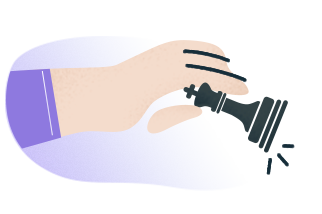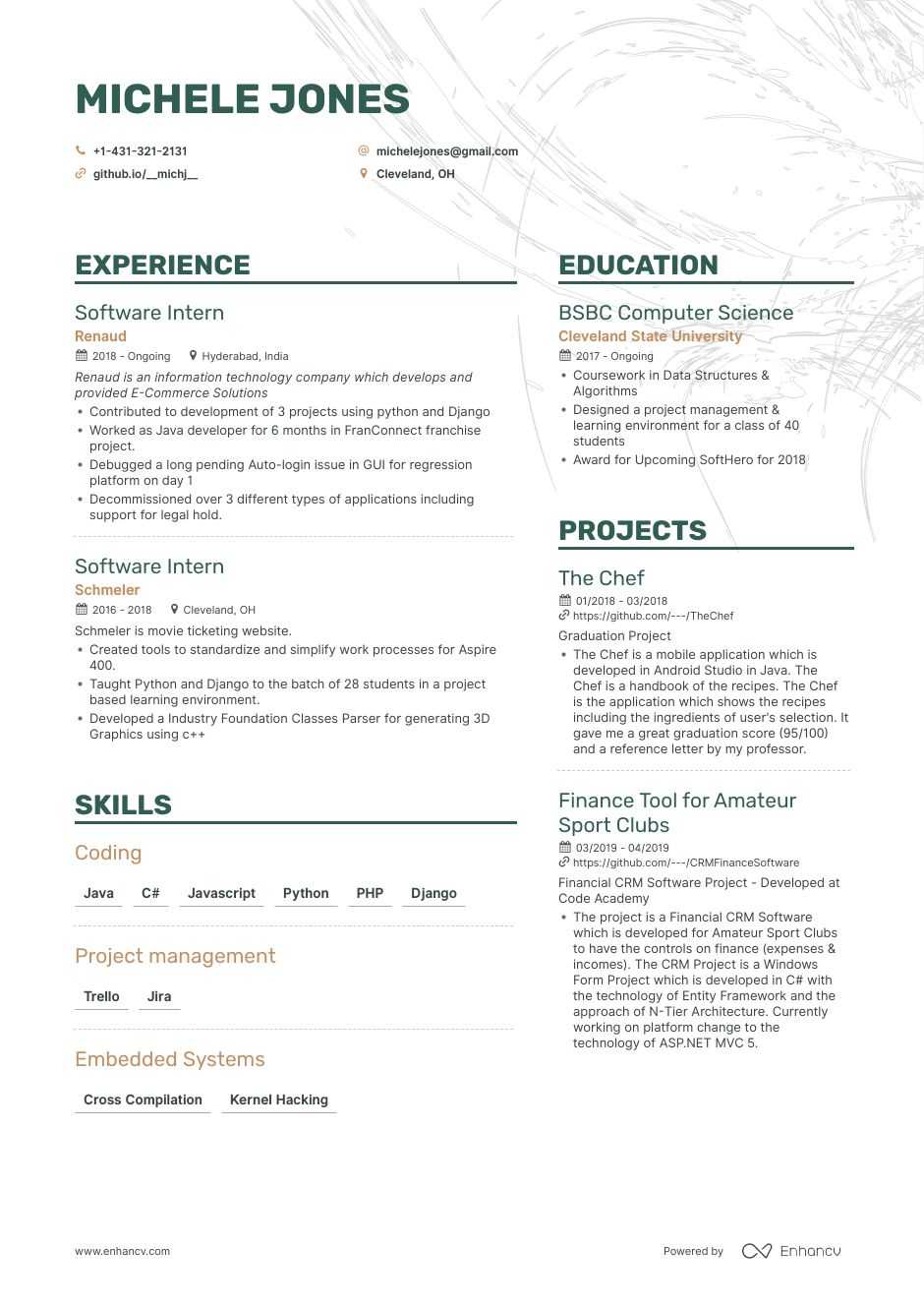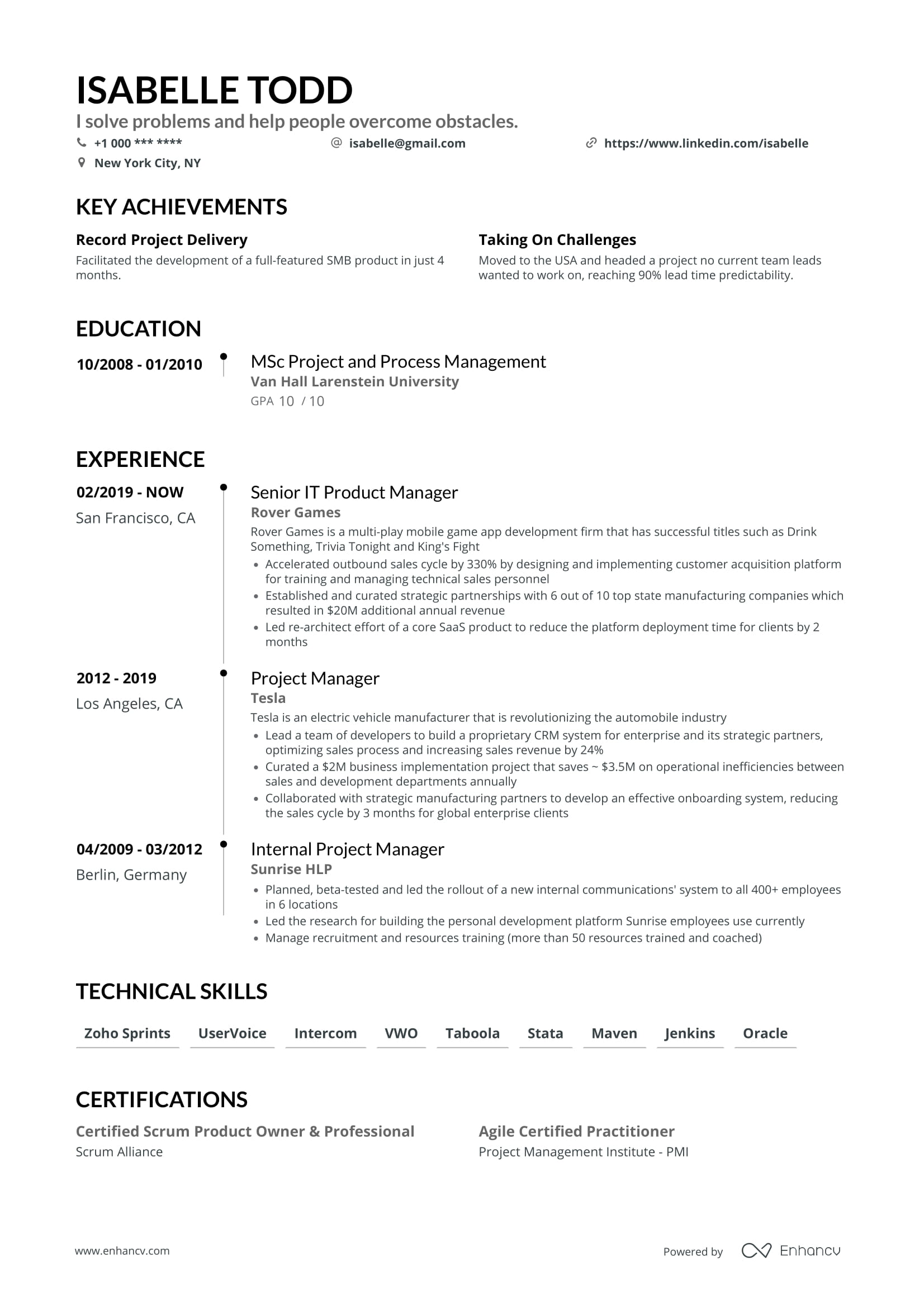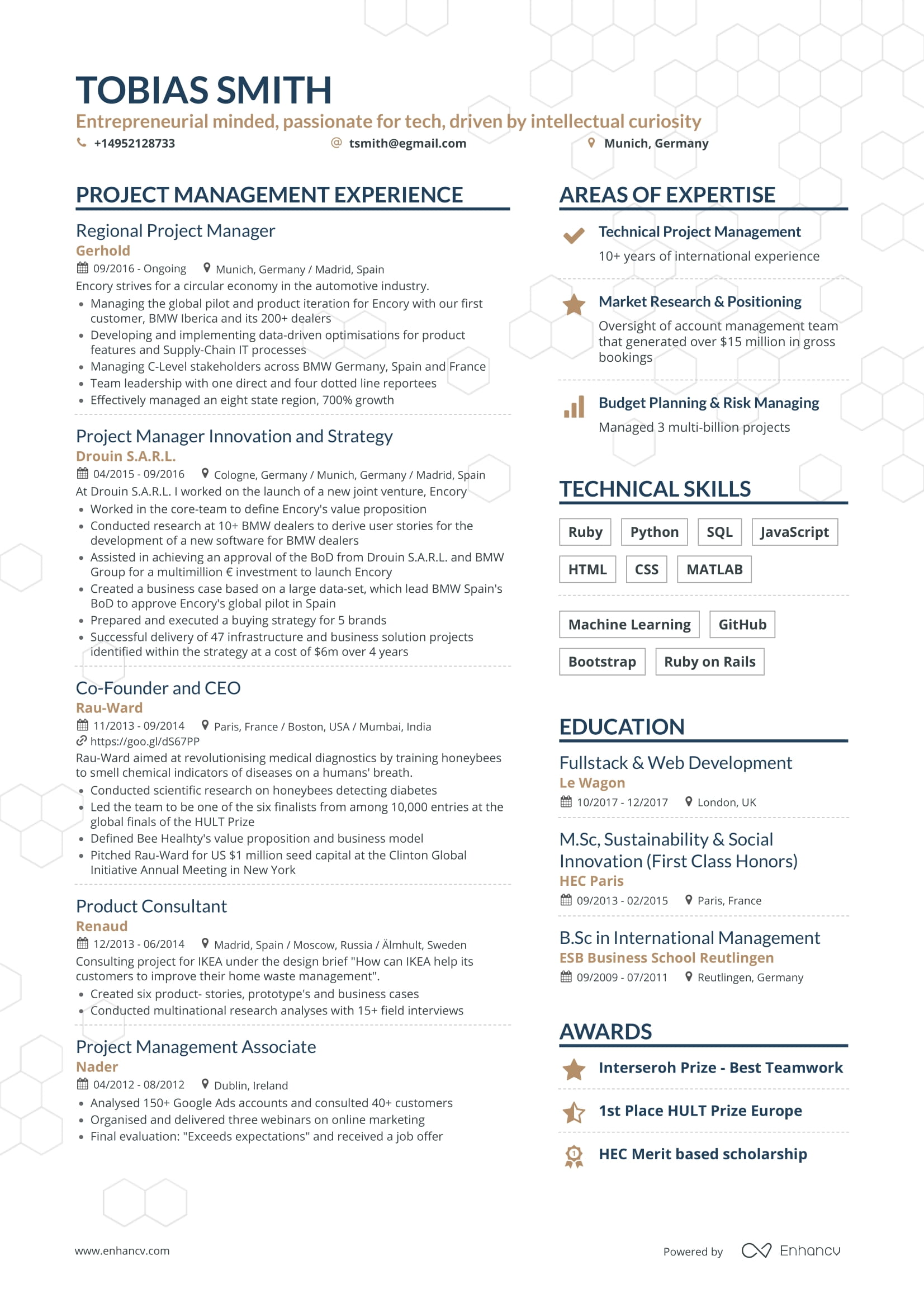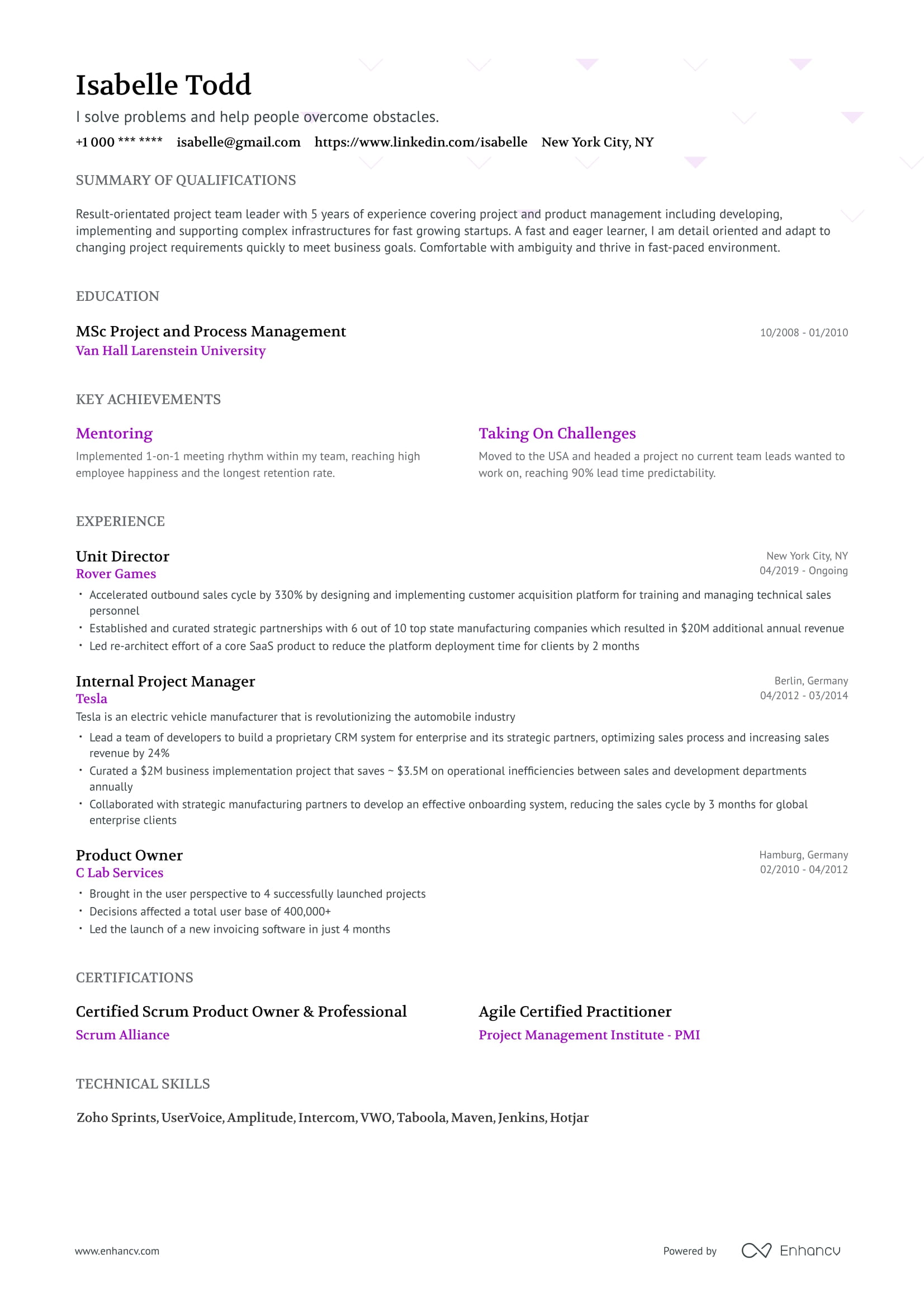Example Entry-level Software Engineer Resume - Browse more resume templates and build a stand-out resume
Have you ever stumbled across an “Entry Level Software Engineer” position that lists so many requirements one might wonder if even seasoned developers could fail at getting it?
Or worse, you’ve finally found this one job you’re a perfect fit for by any measure: technical stack, culture fit, nearby office.
“They even sponsored the last year hackathon I was a part of!”
Excited, you hit “apply”, send your entry level software engineer resume, and then... They ghost you forever without even sending a “Thanks, but…” email.
You may start thinking: “What’s wrong with me? Am I THAT bad?”
Slow down. There’s nothing wrong about you. Your resume, however, is a different story. It should pass a few automatic filters, a couple non-technical recruiters and then, finally, a tech lead.
And it has to sell you at every stage.
“But I’m not a professional resume writer, I like coding.”
Exactly, and we’re here to help you. It’s time to give your resume a total makeover.
If you want to land more interviews without spending months A/B testing your application routine, read this guide.
It’s about time to land that entry level software engineer dream job you’re perfectly capable of doing.
In this guide you’ll learn
- 9 resume examples from the software industry, illustrating good and bad practices
- What do recruiters want to see in your entry level software engineer resume and what matters to them most
- How to properly frame your resume to significantly increase your chances of getting an interview for a specific job opening
- How to pass several HR filters with your resume, including both human and robotic ones
- How to properly format your Header, Summary, Experience, Education, and Skills section to land more interviews
Entry-Level Software Engineer resume example
How to write a Entry-Level Software Engineer resume
When reading your resume, a headhunter is generally interested in:
- Whether your skills match the ones mentioned in the job description
- If you have a passion for development and a knack for fixing problems, or if you accidentally ended up in this industry
- If you have a relevant education degree
- How well can you work with others
- If you have a growing mindset
Entry-Level Software Engineer resume sections that you shouldn’t miss
- A header with an up-to-date contact information and links to your Github / portfolio
- A concise and attention-grabbing Summary section
- A properly formatted and framed Experience section
- An ATS filter-proof Skills section
- A relevant education section
Choosing the best Entry-level Software Engineer resume outline
Depending on your overall development experience, choose eitherreverse-chronological orhybrid layoutfor your resume.
If you have a few development jobs or internships under your belt then describe your experience starting with the latest one. That’s reverse chronological layout.
If most of your development experience comes from personal and student projects, combine your experience with technical skills. Leave out the dates and focus on what you did.
For more information on the best resume formats, read our guide:The Best Resume Formats You Need to Consider (5+ Examples Included).
Read more on how to format your experience in the “Experience section” of this guide.
Entry-level Software Engineer resume header: how to make it crisp
It goes without saying that your header should contain up-to-date contact data so that recruiters can quickly contact you.
However, this is pretty common advice. You know what else your header should contain?
Links. There are at least two links that every successful entry level software engineer candidate can and should provide: the link to their Github and their personal website.
You may not have a personal website, but Github is simply a must.
Some people get jobs solely based on their Github profiles. How is that possible?
Thing is, your Github profile says a lot about you. The number one reason why recruiters are so picky about entry level candidates is because they don’t know much about you.
Little-to-no job experience, no industry connections — you are a dark horse to recruiters. How good is your code, how well do you work in a team?
Your Github can tell them:
- How good is your code (clean, concise, with thoughtful comments)
- How well do you work with others (did you contribute to projects with multiple developers?)
- Whether you can effectively work with someone else’s code (did you contribute to other projects?)
- If you have a passion for programming (did you develop open-source, community-oriented projects?)
You’re missing out a lot if you don’t link to your Github profile. And you’re missing out even more if you don’t have an active Github profile to start with.
The second link in your header is the link to your personal website with your development projects.
Even if your personal projects are not commercialized, the mere fact that you finished them signals your passion for programming and your ability to finish projects. A huge win.
Don’t link to your collection of memes or food blog, though. Only your development-related online portfolio.
If you want more ideas for stand-out resume headers, read through our guidePerfecting Your Resume Header so You Get Noticed.
Now that your header is set up, it’s time to move onto your Summary section.
Entry-level Software Engineer resume objective: write for impact
A proper summary section is an invitation for a recruiter to read your resume further.
It’s your opportunity to briefly describe:
- You past development experiences
- Internships and co-ops
- Contributions to major software projects
Your summary is NOT a place to:
- Brag about your GPA
- Overwhelm recruiters with all the technical terms you’re familiar with
Yes, a high GPA in computer science is something that entry-level software engineering resumes can be judged on, especially in large and highly bureaucratized companies.
Yes, it’s important to be familiar with frameworks and programming languages that the job you’re applying to requires.
However, it’s a double edged sword. High GPA can also signal that you’re a high-ego candidate that can be a pain to deal with in a collaborative environment.
And name-dropping technical terms in the summary doesn’t mean you know them. You could simply copy-paste them from someone else’s resume, especially if you list them without context.
Especially when you list a bunch of technologies in a single line that are rarely used in the same project simultaneously.
Do you know how many applicants lie on their resumes?85 percent. Don’t wave this red flag in front of recruiters.
It’s much better that you demonstrate your technical competence in the context of your past experiences in the “Experience section” and list them in the devoted “Skills section”.
And you’ll have a separate “Education section” to highlight your GPA and relevant coursework.
If you feel, based on the job description, that education means a lot to the company you’re applying for, consider putting the Education section right after the Summary.
A good summary section is tailored to the job you’re applying for.
Imagine a software company is looking for a candidate. In its job description there are several requirements, e.g. a Computer Science degree and Java programming experience.
If you have experience with Java, don’t just put “I know Java”. Define a context where you used this language.
If the company’s main focus is mobile development, briefly talk about your mobile development experiences.
Your summary doesn’t have to be very detailed, just specific enough to spark interest in the recruiter and make them check out your Github profile or Experience section.
For more tips on crafting an attention-grabbing resume summary, check out our guideResume Summary: How-To Guide (30+ Examples You Need To See).
If you’re looking to craft a compelling resume objective instead, read our writing tips at10 Resume Objective Examples You Need to Steal (How-to-Guide).
Let’s move onto the “Experience section”. It’s crucial, and yet it’s the most terrifying part of the resume for aspiring developers with little-to-no experience.
But no worries, we’ll help you write it. Keep reading.
Entry-level Software Engineer resume experience talking points
After browsing hundreds of job descriptions, we’ve found that the majority of them require up to 3 years of programming experience from junior software developers.
Well, that’s nonsense. How are you expected to have this experience, if that’s your first job?
This game is rigged. It’s unfair to fresh-out-of-university candidates, but we have to play along.
How?
The thing is, you most likely do have the experience required for the job. That’s your new mindset.
That group student project, that library website you’ve been working to set up, that chatbot you created to prank friends?
This all counts, provided you explain how it relates to the needed job skills and experience.
If you had an internship or tried creating your own startup — that’s even better.
Anything counts as long as you created code that actually did something.
When describing your experience, you should mention:
- Process
- Technology
- Accomplishment
Below is an entry-level software engineer resume sample experience section that lacks all three:
When describing your experience, follow this formula:
Achieved [something], measured by [something] by doing [something]
E.g.
- Reduced a student library website’s loading time by 78% by refactoring legacy Javascript codebase
- Implemented a Java-based back-end solution that allowed students to browse their coursework via mobile devices
Remember that this is a valuable opportunity to showcase your technical skills as much as your overall development competence.
In order to perfect your experience section, carefully examine the description of the job you’re applying for.
Take a look at this job description for an entry-level software developer position that we pulled from an existing headhunting website:
- Must possess a Bachelor's Degree (preference of Computer Science and Engineering)
- 0-2 years of experience
- Excellent problem solver
- Possess a thorough understanding of Object-Oriented Programming (OOP)
- Exposure to one of the following: Java, .NET, JavaScript, Scala, Ruby, C#, C++, Python, CSS
- Solid introductory familiarity of MS SQL
- Outstanding verbal and written communication skills (Strong Communicator)
- Must be authorized to work in the US on a permanent status
Try your best to describe your experience with any of the highlighted keywords, but don’t just list them. Always create a process-technology-accomplishment narrative as shown previously.
Tailoring your resume to the exact keywords that are featured in the job description will also allow you to pass through automatic ATS filters. We’ll cover that in detail in the “Skill” section.
Those can reject your resume even before recruiters have a chance to look at it if the resume doesn’t have enough relevant keywords.
Other things that are important to mention:
- Teamwork experience
- Adjacent experience (e.g. network management, system administration)
Remember, you can describe your personal and student projects experience in the same manner.
A properly framed experience section significantly increases your chances for a follow-up call from a human recruiter.
For more ideas on how to create an actionable resume experience section, check out our guideHow to Describe Your Resume Work Experience.
However, you still need to pass automatic ATS filters and prove that you have the relevant technical and soft skills for the job.
There’s a “Skill section” for that. Let’s cover it.
Don’t forget an Entry-level Software Engineer resume skills section
Every job description specifies technical skills that each successful candidate should have.
You’ll find out those by examining the job description, as mentioned in the previous section.
It’s important to list those skills on your resume not just to pass human recruiters, but also automatic ones.
Application Tracking Systems are created to scan your resume for specific keywords, and to reject it if your resume does not contain at least some of them.
The more technical skills you mention in this section, the better, but remember: don’t lie on your resume. It’s a road to nowhere.
How to make sure your tech skills get noticed by ATS tools
Suppose there is a job description that looks like this:
- Bachelor’s degree in Computer Science, Computer Engineering, MIS, or other related field preferred
- Knowledge of Java, JavaScript, React, Redux, and SQL is preferred
- High level of attention to detail
- Must be able to work independently and with a team
No candidate is expected to know all the skills that are listed on the resume.
And no one is expected to know several technologies at the same high level.
However, if you have at least some experience with those technologies, put them on your resume. It’ll help you to get past ATS filters.
Also, make sure to list not only the skills the company has in the job description, but also frameworks and languages that are adjacent to it.
It’s important for two reasons. First, you emphasize that you really worked in this environment and didn’t just copy the job description.
Second, it shows that you’re not a narrow specialist and that you understand the scope of your work.
Here’s an example of a skill section in your resume:
Below are the technical skills that are most commonly mentioned in entry-level software engineer resumes:
13 Entry-level Software Engineer resume tech skills wanted by companies
- Java
- .NET
- SQL
- C++
- C#
- C
- JavaScript
- Scala
- Ruby
- Python
- CSS/HTML
- PHP
- Ajax
How to list soft skills on your resume the best way
Technical skills alone won’t help if you’re hard to work with.
Most software engineers operate in a team environment and it’s important for them to effectively collaborate and communicate with others.
However, don’t just blindly put “Client-oriented” and “Collaborative” on your resume without backing it up with some real-world examples.
These 8 Entry-level Software Engineer soft skills stand out on resumes
- Collaboration
- Communication
- Creativity
- Problem Solving
- Critical Thinking
- Analytical skills
- Open-mindedness
- Time-Management
Are you still not sure what skills will win recruiters over? Check out our guide onHow to Create A Resume Skills Section To Impress Recruiters (+10 Examples You Need to See).
How to make your education stand out on the resume
Many companies require a bachelor degree in Computer Science or a related field for an entry-level software engineer position.
Thus, the education section is important for a successful entry-level software engineer resume.
Typical software engineer degrees include:
- Computer Science
- Software Engineering
- Computer Engineering
- Management Information Systems
If your GPA is above 3.0, feel free to highlight it. Otherwise, simply don’t put the number on your resume.
Don’t forget to list specific and fundamental coursework that is related to the development process, such as Data Structures, Algorithms, Networks, Operating Systems, etc.
What to do if your degree is not relevant to software engineering?
There are three things you can do:
- Offset your education section with development experience: companies may substitute a relevant working experience for a degree
- Spin it like your irrelevant education is actually relevant, e.g. you’re applying for a finance software company with a finance degree and real development experience
- Back-up your education section with software engineering certificates
Browse more essential tips on how to feature education on your resume, in our guidePerfecting the Education Section on Your Resume.
Let’s see how certificates can help you get the job.
What should your certificates section look like?
Truth is, no amount of certifications will substitute your working experience or relevant education.
So don’t treat them as substitutes, but rather something that can strengthen your overall profile.
Focus on building personal projects, and getting real development experience.
The only exception would be certificates that prove your knowledge of a specific technology that this particular job opening is about, such as Java, SQL, etc.
Top 3 Industry-recognised Entry-level Software Engineer certificates
For more information on how to properly list resume certifications, we recommend reading our guideHow To List Certifications On A Resume (Examples Included).
Other sections to include on your resume
Depending on the company, job seniority level and your location, you may want to include more sections to your Entry-Level Software Engineer resume:
And that’s how you craft a perfect Entry-level Software Engineer resume
- Make sure every section of your resume demonstrates your passion for development and technical competence at the same time;
- Make sure your resume passes automatic and human HR filters by properly framing your Experience and Skill sections;
- Provide links to your personal projects and Github contributions to emphasize and demonstrate your ability to write clean code and work effectively with others;
- Format your experience to come off as an efficient problem solver, and not another generic candidate.
